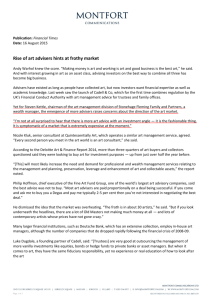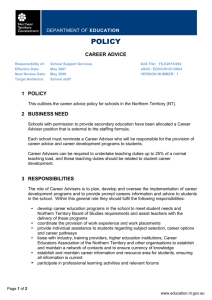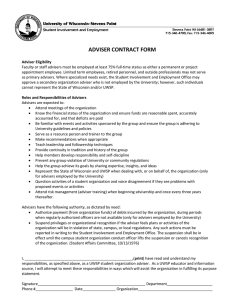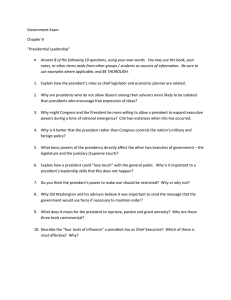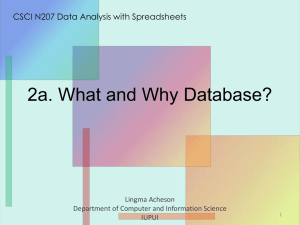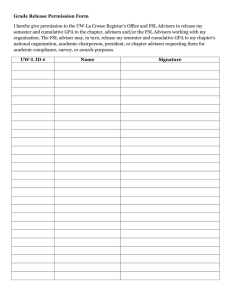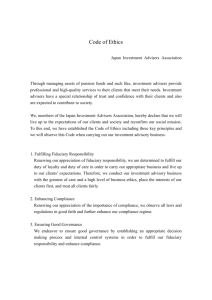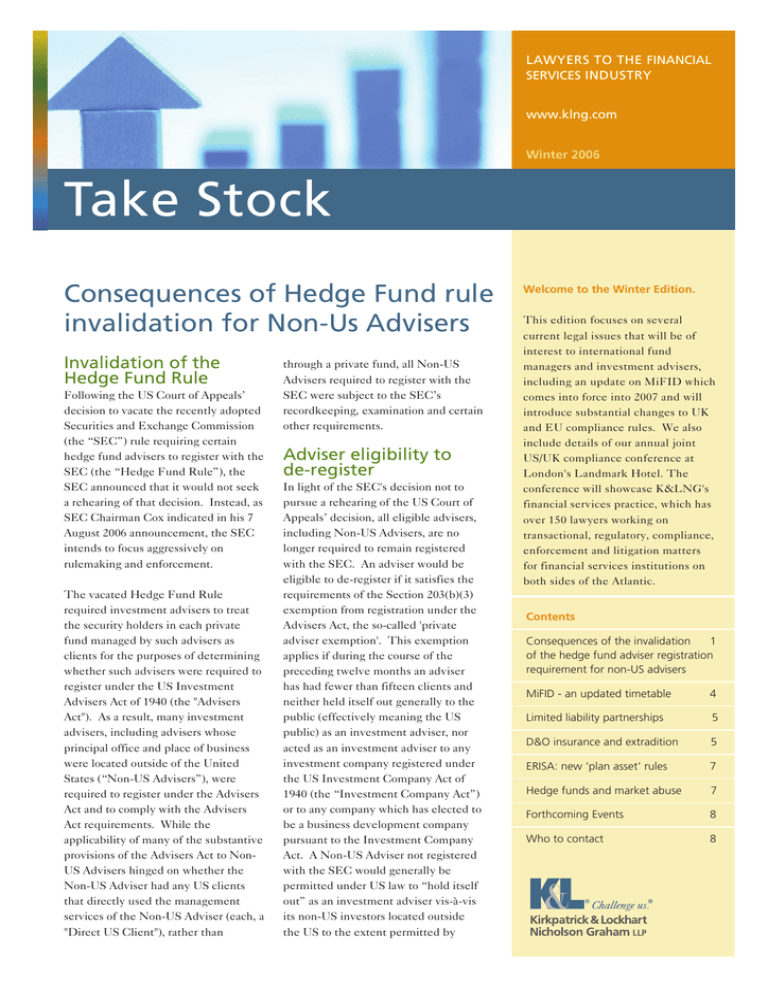
LAWYERS TO THE FINANCIAL
SERVICES INDUSTRY
www.klng.com
Winter 2006
Take Stock
Consequences of Hedge Fund rule
invalidation for Non-Us Advisers
Invalidation of the
Hedge Fund Rule
Following the US Court of Appeals’
decision to vacate the recently adopted
Securities and Exchange Commission
(the “SEC”) rule requiring certain
hedge fund advisers to register with the
SEC (the “Hedge Fund Rule”), the
SEC announced that it would not seek
a rehearing of that decision. Instead, as
SEC Chairman Cox indicated in his 7
August 2006 announcement, the SEC
intends to focus aggressively on
rulemaking and enforcement.
The vacated Hedge Fund Rule
required investment advisers to treat
the security holders in each private
fund managed by such advisers as
clients for the purposes of determining
whether such advisers were required to
register under the US Investment
Advisers Act of 1940 (the "Advisers
Act"). As a result, many investment
advisers, including advisers whose
principal office and place of business
were located outside of the United
States (“Non-US Advisers”), were
required to register under the Advisers
Act and to comply with the Advisers
Act requirements. While the
applicability of many of the substantive
provisions of the Advisers Act to NonUS Advisers hinged on whether the
Non-US Adviser had any US clients
that directly used the management
services of the Non-US Adviser (each, a
"Direct US Client"), rather than
through a private fund, all Non-US
Advisers required to register with the
SEC were subject to the SEC’s
recordkeeping, examination and certain
other requirements.
Adviser eligibility to
de-register
In light of the SEC's decision not to
pursue a rehearing of the US Court of
Appeals’ decision, all eligible advisers,
including Non-US Advisers, are no
longer required to remain registered
with the SEC. An adviser would be
eligible to de-register if it satisfies the
requirements of the Section 203(b)(3)
exemption from registration under the
Advisers Act, the so-called 'private
adviser exemption'. This exemption
applies if during the course of the
preceding twelve months an adviser
has had fewer than fifteen clients and
neither held itself out generally to the
public (effectively meaning the US
public) as an investment adviser, nor
acted as an investment adviser to any
investment company registered under
the US Investment Company Act of
1940 (the “Investment Company Act”)
or to any company which has elected to
be a business development company
pursuant to the Investment Company
Act. A Non-US Adviser not registered
with the SEC would generally be
permitted under US law to “hold itself
out” as an investment adviser vis-à-vis
its non-US investors located outside
the US to the extent permitted by
Welcome to the Winter Edition.
This edition focuses on several
current legal issues that will be of
interest to international fund
managers and investment advisers,
including an update on MiFID which
comes into force into 2007 and will
introduce substantial changes to UK
and EU compliance rules. We also
include details of our annual joint
US/UK compliance conference at
London's Landmark Hotel. The
conference will showcase K&LNG's
financial services practice, which has
over 150 lawyers working on
transactional, regulatory, compliance,
enforcement and litigation matters
for financial services institutions on
both sides of the Atlantic.
Contents
Consequences of the invalidation
1
of the hedge fund adviser registration
requirement for non-US advisers
MiFID - an updated timetable
4
Limited liability partnerships
5
D&O insurance and extradition
5
ERISA: new 'plan asset' rules
7
Hedge funds and market abuse
7
Forthcoming Events
8
Who to contact
8
Take Stock
which it trades in securities or other
financial instruments, for example,
registration under the Advisers Act
may be necessary if the Non-US
Adviser desires to have a significant
portion of its assets under
management represented by US
employee benefit plans subject to
the US Employee Retirement
Income Security Act of 1974
("ERISA"). In particular, investment
adviser registration may be helpful
for a Non-US Adviser for the
purposes of meeting the “QPAM
Exemption,” which is an exemption
issued by the US Department of
Labor under ERISA that provides
broad relief for otherwise prohibited
transactions between an ERISA plan
and certain parties in interest of the
plan if the transactions are
negotiated on behalf of the plan by a
“qualified professional asset
manager” (“QPAM”);
other applicable law. Following the
invalidation of the Hedge Fund Rule, a
hedge fund adviser no longer needs to
look through the funds it manages and
count the individual investors as clients
for purposes of the private adviser
exemption. For the Non-US Advisers,
only US clients must be counted.
Consequently, Non-US Advisers with
fourteen or fewer Direct US Clients
can now de-register to the extent they
otherwise comply with the ‘private
adviser exemption.’
Non-US Advisers not meeting the
above requirements should generally
remain registered with the SEC or,
alternatively, may bring themselves in
compliance with such requirements by
reducing the number of their Direct US
Clients to fourteen or fewer by the date
of their intended withdrawal from
registration, and satisfying other
applicable requirements.
Benefits of remaining
registered; other
considerations
n
The improved ability to satisfy the
due diligence requirements of the
adviser’s potential investors or
service providers (for example, a
Non-US Adviser’s registration with
the SEC may help alleviate antimoney laundering and other due
diligence concerns of a Non-US
Adviser’s potential investors and
service providers); and
n
The ability to hold itself out as an
investment adviser to US investors
(Registered Non-US Advisers can
provide their US investors, including
their potential investors, with certain
additional information about the
Adviser’s business and operations,
including through their internet
sites, without potentially subjecting
themselves to the risks of being
viewed as “holding themselves out”
as investment advisers in violation of
US securities laws. Nonetheless,
even registered Non-US Advisers
Eligibility
Notwithstanding the invalidation of the
Hedge Fund Rule, a Non-US Adviser
can remain registered under the
Advisers Act so long as it engages in the
business of advising others for
compensation as to the value of
securities and/or otherwise meets the
definition of “investment adviser”
under the Advisers Act, even if it does
not have $25 million under
management (generally required of USbased investment advisers in order to
register with the SEC).
Benefits
Benefits of remaining registered with
the SEC may include the following:
n
2
The improved ability to satisfy legal
requirements of various jurisdictions
in which the adviser has clients or in
WINTER 2006
should be aware that any private
sales of securities to US persons will
generally be subject to the
limitations of private placement
exemptions of the US Securities Act
of 1933).
SEC Initiatives
In addition, the SEC has confirmed
that in order to eliminate disincentives
for voluntary registration and to enable
hedge fund advisers that are already
registered to remain registered, the
registered investment advisers will
continue to benefit from the SEC
initiatives that were provided in the
Hedge Fund Rule. Such initiatives
include:
n
Allowing investment advisers to
private funds which registered with
the SEC as a result of the Hedge
Fund Rule to continue receiving
performance-based compensation
from private funds with nonqualified investors and from other
clients who are not "qualified clients"
if those persons became equity
investors in the private fund or
entered into investment advisory
contracts with the adviser before 10
February 2005 (without this
amendment, newly registered NonUS Advisers that remain registered
with the SEC would have been
required to terminate certain existing
advisory contracts and fee
arrangements with US clients that
provide for performance-based
compensation); and
n
Not requiring advisers to private
funds which registered with the SEC
as a result of the Hedge Fund Rule
to maintain books and records to
support the performance of any
private fund or other account for any
period ended prior to 10 February
2005. (The rule was designed to
accommodate newly registered
www.klng.com
hedge fund advisers that may not
have kept records meeting the
requirements of the rule and to
prevent them from being at a
competitive disadvantage as a result
of their inability to use their
performance records if they had not
maintained records sufficient to
meet the requirements of the
Advisers Act.).
The SEC has also confirmed that NonUS Advisers with no Direct US Clients
will continue to be relieved from
various requirements applicable to all
other SEC-registered investment
advisers. For example, such Non-US
Advisers will not be required to
designate a ‘chief compliance officer’
for US purposes and need not have a
'code of ethics'.
Applicability of US Securities
Laws
Non-US Advisers that elect to deregister should be aware that they
would remain subject to the SEC’s
guidance and will continue to benefit
from certain exemptions applicable to
Non-US Advisers. In particular, the
SEC previously adopted a ‘conduct and
effects’ test to regulate the activity of
non-US advisers. Under the conduct
test, conduct that takes place in the
United States, wholly or in substantial
part, would be sufficient to justify
application of the securities laws, even
if that conduct has no effect on United
States persons or markets. Under the
effects test, the securities laws would
be applied to conduct outside the
territory of the United States that has or
is intended to have substantial and
foreseeable effects within the United
States. Based on this approach, a NonUS Adviser, whether or not registered
with the SEC, would generally be
exempt from the requirements of
applicable US laws (including the
Advisers Act as relating to such
advisers’ fiduciary duties to their
clients that apply to both registered and
unregistered investment advisers; the
US Gramm-Leach Bliley Act; the US
Securities Act of 1933; the US
Securities Exchange Act of 1934 and
the US Insider Trading and Securities
Fraud Enforcement Act of 1998), with
respect to its non-US clients to the
extent that any activity relating to such
clients does not take place in the
United States and has no intended
substantial effects within the United
States.
the fiscal year during which the last
entry was made on such record) and to
notify the SEC of their location.
Accordingly, Form ADV-W, among
other things, requires the withdrawing
advisers to provide the information
relating to such advisers’ contact
information and the location of their
required books and records. The
withdrawal is effective upon the SEC’s
receipt of the filing and its
determination that the filing is not
deficient.
Timing Considerations
Further Regulation
Furthermore, advisers considering deregistration should also be aware that
both the SEC and US Congress may
still act in a way that would subject
unregistered investment advisers,
including the Non-US Advisers, to new
rules or regulations, although it is
difficult to assess the likelihood of any
such event. In particular, a bill has
been introduced in Congress that could
potentially reinstate the Hedge Fund
Rule through legislation. Other
potential proposals that are being
discussed include the introduction of
the additional reporting requirements
for investment advisers, the
establishment of a self-regulatory
regime and the creation of additional
incentives for advisers to register and to
remain registered under the Advisers
Act.
De-registration process
Form ADV-W
If an adviser, including a Non-US
Adviser, determines that it is eligible to
de-register, and that it would like to do
so, such adviser should file Form ADVW electronically with the SEC. The
withdrawing adviser is required by the
Advisers Act to maintain certain books
and records for the remainder of the
period required under the Advisers Act
(generally, five years from the end of
In the event an adviser determines to
proceed with de-registration, it should
consider doing so before 1 February
2007 to avail itself of the exemptions
made available by the SEC for such
advisers. In particular, certain Non-US
Advisers will be deemed to have
custody of their US investors’ assets
under the Advisers Act even if such
assets are held by a third party
custodian and will, therefore, upon
withdrawal be required to prepare and
file a balance sheet as a condition to deregistration. Preparing and filing a
balance sheet would not only result in
additional costs to the Non-US
Advisors, but will also require the NonUS Advisers to reveal information that
would otherwise not be publicly
available, at least in the US. In order to
provide a relief to advisers that would
like to de-register as a result of the
invalidation of the Hedge Fund Rule,
the SEC will not require advisers with
custody of their clients’ assets to
prepare and file a balance sheet as a
condition to de-registration, if such
advisers de-register by 1 February
2007.
For more information please contact
Kay Gordon, New York office.
Email: kgordon@klng.com
Telephone: 001 212 536 4038
WINTER 2006
3
Take Stock
MiFID - an updated timetable
During October 2006
FSA Consultation on Reforming Conduct of Business Regulation
By 31 October
Close of Consultation period on CP06/14
During December 2006
FSA Consultation on MiFID provisions on marketing communications, as part of the wider FSA
financial promotions review
During January 2007
Publication of feedback on CP06/14
By 31 January 2007
EU countries are required to have all their MiFID implementing measures in place.
1 November 2007
MiFID comes into effect across all 25 countries of the EU
Recent developments in MiFID
Since our last MiFID update (Take
Stock - Summer 2006 Edition) the FSA
has published its Consultation Paper on
Systems and Controls (CP06/9) (in May
2006) and a Discussion Paper on "Best
Execution under MiFID" (DP06/3)
with a draft proposal for
implementation due in October 2006 in
the Consultation on Reforming
Conduct of Business Regulation.
On 15 June 2006 the European
Parliament Committee on Economic
and Monetary Affairs announced that
the European Parliament had voted in
favour of the modified draft level 2
4
WINTER 2006
measures to implement MiFID. The
European Securities Committee
published the latest text of the draft
level 2 measures on 30 June 2006 and
the Regulation and Directive were
finally published in the EU's Official
Journal on 2 September 2006.
The FSA's consultation paper
"Implementing MiFID for firms and
markets" (CP06/14) was published in
June 2006. This paper dealt with
authorisation and passporting,
appointment of tied agents, regulatory
enforcement and cooperation,
principles for business, client assets and
certain prudential requirements,
regulated markets and multilateral
trading facilities, market transparency
and transaction reporting.
The FSA published a paper on
Implementing MiFID's client
categorisation requirements during
August 2006.
An updated timetable of events
relating to the implementation of
MiFID in the UK is above.
www.klng.com
New method for calculating capital resources of
limited liability partnerships
In section 6 of its July 2006 quarterly
consultation paper (CP 06/13) the FSA
consulted on a new rule in the interim
prudential sourcebook for investment
firms relating to the inclusion by
limited liability partnerships ("LLPs")
of their members' capital in their
regulatory capital resources
calculations.
At present under FRS 25 (the UK
financial reporting standard that
implemented international accounting
standard IAS 32, and which covers the
classification of financial instruments
either as liabilities or as equity) some
members' capital is accounted for as
equity and some is accounted for as a
liability. Regardless of the FRS 25
treatment, it is current practice for
LLPs to include members' capital in
their regulatory capital resources
calculations as if it were partners'
capital even though, strictly speaking,
they have no right to do this under
current regulatory rules because of a
lacuna in IPRU (INV).
The FSA has recently looked at the
way in which LLP members' capital is
included in regulatory capital
calculations with a view to dealing with
the lacuna in IPRU (INV), and
clarifying the position.
CP 06/18 proposes that LLPs may
include members' capital within the
highest tier of their regulatory capital
resources calculations, but only subject
to certain conditions. These conditions
include requirements that the
members' capital of the LLP should
meet standards of permanency, loss
absorbency and discretion over
contributions, giving consistency with
the characteristics required of other
forms of capital that count within the
highest tier. The LLP must also
document the inclusion of members'
capital within regulatory capital
through a declaration signed by all
members of the LLP and it must be
accounted for as equity under FRS 25.
The new rule should come into effect
on 1 April 2007, although those LLPs
subject to the Capital Requirements
Directive (("CRD") the EU's re-cast
capital adequacy directive)(being
certain types of investment firms) will
need to comply with the new rule from
1 January 2007 when the general
prudential sourcebook for banks,
building societies, investment firms
and insurers ("GENPRU") comes into
force and which will incorporate the
new LLP rules.
Extradition - Is it a real threat and will D&O
insurance cover the costs?
There has in recent months been a
huge amount of scaremongering in the
press following the extradition of the
NatWest Three and the jailing of Nigel
Potter, former Chief Executive of
Wembley, on charges of wire fraud.
The US authorities have come under
heavy criticism for taking advantage of
the UK/US Extradition Treaty (not yet
ratified by the US) to extradite British
businessmen when its real aim was to
assist the war on terrorism. Over half
the extradition requests made under
the new law appear to relate to white
collar crime offences. It seems that
executives are being targeted as part of
a US crackdown on white collar crime
post Enron.
Under the new regime, the US
authorities are no longer required to
provide evidence of a prima facie case
but simply to provide "information"
that would justify the individual being
arrested for a crime punishable in both
countries by a sentence of at least 12
months. In practice, this means that
extradition is a real possibility for
offences such as bribery, fraud, insider
dealing, tax evasion and cartels.
The long arm of US jurisdiction is such
that directors of any business with a
presence in US markets or with US
investors may face prosecution from
the US authorities for these type of
offences. The US offences of "mail
fraud" or "wire fraud" have also been
used by the US authorities to extend its
jurisdiction even further, to cases
where the criminal conduct stems from
outside the US but involves the use of
the US postal system or electronic
communication systems. The NatWest
Three is the prime example.
WINTER 2006
5
Take Stock
With regard to cartel activity, this was
only recently made a criminal offence
for individuals in the UK pursuant to
the Enterprise Act 2002. Ian Norris,
former CEO of Morgan Crucible, is
relying on this in his attempts to resist
extradition to the US for allegedly
conspiring to fix the price of carbon
products between 1989 and 2000. The
outcome of his case may have knock on
implications, with rumours afoot that
the US Department of Justice intends
to pursue other British and overseas
businessmen in relation to alleged price
fixing.
The focus has to date been on
extradition to the US which is where
the majority of extradition requests
have come from. It is worth bearing in
mind, however, that the more relaxed
evidential requirements also apply to
requests for extradition made by EU
member states and to other states such
as Russia and Albania. It is possible
that requests from other countries will
become more common place.
Until recently, directors and officers
liability (D&O) insurance cover has not
generally referred to extradition nor to
the costs of defending extradition
proceedings. This is not entirely
surprising given that extradition has not
until recently been regarded by
policyholders, nor by insurers, as an
obvious threat. The D&O policy will
typically provide cover for the costs of
defending criminal proceedings
although such costs may be excluded,
or at least become repayable, in certain
circumstances, for example in the event
of fraud or dishonesty. It is of course
arguable that "defence costs" should
include the costs of fighting
extradition, particularly if this avoids
any criminal proceedings being
brought. In the light of recent
developments, however, policyholders
should consider requesting specific
6
WINTER 2006
confirmation from their D&O insurers
that the costs of fighting extradition are
covered by the policy.
Policyholders should also check
whether their D&O policy does
actually cover proceedings and
investigations brought in the US.
Many D&O insurers expressly exclude
US claims and an additional premium
will normally be payable for US cover.
Even if the policyholder does not have
any shares (or ADRs) traded in the US,
nor any subsidiaries or other entities
operating within the US, the concern is
that directors can still be drawn into US
regulatory or criminal proceedings.
The long arm of the US jurisdiction is
such that policyholders may wish to
reconsider the need for US cover, even
in circumstances where connections
with the US appear somewhat tenuous.
If you would like to attend the Seminar
on Directors' Liabilities and D&O
Insurance at our London office on
Friday 10 November 2006, please
contact from our London Insurance
Coverage group either Jane HarteLovelace (jhartelovelace@klng.com) or
Sarah Turpin (sturpin@klng.com).
Alternatively, if you would like a
review of your D&O cover please let us
know.
www.klng.com
ERISA: New “Plan Asset” rules
for unregistered funds
Among the sweeping changes made by
US 'Pension Protection Act of 2006' to
the Employee Retirement Income
Security Act of 1974 ("ERISA") are
significant amendments to the rules for
determining whether ERISA applies to
unregistered private investment funds
and their sponsors, advisers, and
managers.
For the past twenty years, private fund
managers that permit investment by
plans subject to ERISA have looked to
a regulation issued by the US
Department of Labor to determine
whether the assets of their funds are to
be treated as “plan assets” for purposes
of ERISA. The regulation includes the
now-familiar '25% test' which provides
that the assets of a privately offered
investment fund not registered under
the US Investment Company Act of
1940 are treated as ERISA 'plan assets'
if 'benefit plan investors' own 25% or
more of the value of any class of equity
interests in the fund. The 25% test has
been changed in two significant
respects:
n
n
First, only plans subject to ERISA
are to be taken into account in
computing the percentage. Before
the change, the numerator of the
computation included investments
by plans of all types, including
government plans and non-US plans
not subject to ERISA.
Second, only that portion of the
assets of a 'plan-assets fund' that is
attributable to investing ERISA
plans is taken into account for
purposes of applying the 25% test to
another private fund in which the
first fund invests. Before the
change, the entire investment of a
plan-assets fund was included in the
numerator.
The net effect of these changes (which
take effect with respect to transactions
occurring on or after 18 August 2006) is
that private fund managers will be able
to raise significantly more capital from
ERISA plans without being subject to
the fiduciary responsibility standards or
prohibited transaction restrictions of
ERISA. Managers that follow a policy
of restricting plan investments in order
to avoid the application of ERISA are
now in a position to permit potentially
substantial additional investments by
plans. The changes also permit ERISA
plans to take advantage of
opportunities to invest in private funds
that may have been unavailable to
them up to now.
Private fund managers have a number
of practical issues to address (including,
for example, assessing the impact of
the revised 25% test on the status of
the manager’s fund(s) under ERISA
and the manager's ERISA compliance
procedures).
For further information please contact
William Wade, Los Angeles office.
Email: wwade@klng.com
Telephone: 001 310 552 5071
Hedge Funds
and market
abuse: The
lessons of The
Jabre case
During 2006 the FSA has been
focusing its attentions on the regulation
of the hedge fund industry and its
perceptions of possible market abuse
within that industry. The hedge fund
market abuse case of Philip Jabre has
resulted in the biggest fine ever
imposed on an individual and marked a
high profile victory for the FSA,
providing a useful example of how the
FSA deals with regulation and
enforcement in the hedge fund
industry.
Background
On 28 February 2006 the FSA handed
Philippe Jabre a decision notice
imposing a financial penalty of
£750,000 for:
(a) committing market abuse contrary
to section 118 of the Financial Services
and Markets Act 2000 ("FSMA") since
between 12-14 February 2003 Mr Jabre
improperly short sold shares in
Sumitomo Mitsui Financial Group Inc.
("SMFG") to the value of $16 million
whilst in possession of privileged
information;
(b) breaching Principles 2 (Due Skill,
Care & Diligence) and 3 (Market
Conduct) of the FSA's Statements of
Principle for Approved Persons; and
(c) failing to properly consult his
compliance department (amounting to
a breach of Principle 2).
WINTER 2006
7
Take
StockChecks
Travellers’
Mr Jabre's defence focused on two
points:
n
(a) Goldman Sachs had agreed that he
could continue with a pre-existing
trading pattern of trading SMFG stock
and that his trades were consistent with
the pre-existing trading pattern; and
n
(b) the trades in question were not
within the FSA's jurisdiction under
section 118 of FSMA because they
occurred on the Tokyo Stock Exchange
which is not a "prescribed market" for
the purposes of that section.
n
These arguments were rejected by the
FSA which found that Mr Jabre's
activities did occur in relation to
investments traded on a prescribed
market despite the trades occurring on
a non-prescribed market, the Tokyo
Stock Exchange. This was because the
relevant shares were also quoted on the
LSE's "SEAQ International Trading
System" (which has since closed and all
shares which were traded on SEAQ are
now traded on the LSE's ITBU
segment).
Key lessons learnt:
n
Hedge fund managers will have to
be more disciplined in consulting
their own compliance officers;
Hedge fund managers must have a
clear understanding as to when they
are taken "over the wall" with
privileged information and know the
distinction between a sounding out
proposal and relevant information for
the purposes of market abuse;
Management groups will have to
strengthen their compliance
departments and create a more proactive culture of understanding of
compliance issues across the firm;
and
The definition of qualifying
investments is broadly interpreted
and the FSA's powers can extend to
foreign stock exchanges where the
shares are also listed on the ITBU
segment of the LSE's International
Bulletin Board (i.e. formerly listed
on SEAQ).
The above lessons provide some useful
insight as to the direction of FSA
regulation of the hedge fund industry.
The FSA's preference so far has been
to work with the hedge fund industry
and not over-regulate the market and
push the industry offshore; the Jabre
decision confirms its preference for
supporting existing regulation in a
focused manner.
10 November 2006
Seminar on Directors' Liabilities and
D&O Insurance (see page 5)
29 January 2007
K&LNG All Day Conference "Critical Regulatory Issues for
International Fund Managers and
Investment Advisers", at the Landmark
Hotel, Marylebone, London. Topics
covered will include:
n
n
n
n
n
New Developments in FSA
Regulation of Investment Managers
New Developments in Hedge Fund
and Offshore Fund Regulation
Ins and Outs of ERISA Prohibited
Transaction Exemptions
2007 Hot Topics for Investment
Managers
New Developments Affecting SEC
Registered Fund Advisers
For more information please contact
Kathie Lowe, London office.
Email: klowe@klng.com
Telephone: +44 20 7360 8248
Kirkpatrick & Lockhart
Who to Contact
Nicholson Graham LLP
For further information contact the following
Philip Morgan
Neil Robson
Forthcoming events
+44 (0)20 7360 8123
+44 (0)20 7360 8130
pmorgan@klng.com
nrobson@klng.com
110 Cannon Street
London EC4N 6AR
www.klng.com
T: +44 (0)20 7648 9000
F: +44 (0)20 7648 9001
Kirkpatrick & Lockhart Nicholson Graham (K&LNG) has approximately 1,000 lawyers and represents entrepreneurs, growth and middle market companies,
capital markets participants, and leading FORTUNE 100 and FTSE 100 global corporations nationally and internationally.
K&LNG is a combination of two limited liability partnerships, each named Kirkpatrick & Lockhart Nicholson Graham LLP, one qualified in Delaware, U.S.A. and
practicing from offices in Boston, Dallas, Harrisburg, Los Angeles, Miami, Newark, New York, Palo Alto, Pittsburgh, San Francisco and Washington and one
incorporated in England practicing from the London office.
This publication/newsletter is for informational purposes and does not contain or convey legal advice. The information herein should not be used or relied
upon in regard to any particular facts or circumstances without first consulting a lawyer.
Data Protection Act 1998 - We may contact you from time to time with information on Kirkpatrick & Lockhart Nicholson Graham LLP seminars and with our
regular newsletters, which may be of interest to you. We will not provide your details to any third parties. Please email london@klng.com if you would prefer
not to receive this information.
8
WINTER 2006
© 2006 KIRKPATRICK & LOCKHART NICHOLSON GRAHAM LLP. ALL RIGHTS RESERVED.

